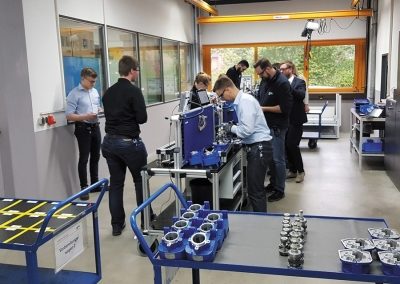Nord Integrates Trainees into Management Processes with NordPro Initiative

Optimum customer satisfaction can only be achieved with optimally trained employees: This is the basic idea behind the NordPro initiative, which has operated a laboratory with the same name since 2011.
Here, employees receive training in the fundamentals of lean management and are given ideas for implementing these ideas in their daily work. The program is organized and managed by Nord trainees who use this opportunity to extend their organizational and representational skills. This "hands-on" experience is also an important part of the comprehensive Nord training program.
NordPro was founded in 2008 to sustainably ensure customer satisfaction in an age of increased expectations. The idea: To actively communicate lean management methods to employees in order to give them the tools with which company processes can be optimized for the benefit of customers. The program first started with the five tools Kaizen, Fluss, SMED, TPM, and Q-Groups, but since then has been continuously developed to include new methods.
In 2011, the initiators went a step further with the NordPro Lab. Specially equipped areas were created at the Bargteheide site, where various modularly structured training courses with a heavy practical emphasis are now held. Here, the theoretical knowledge of lean management which has been acquired is utilized and deepened using simulation games. By dealing with hypothetical problems, participants learn the effects of process improvements, in addition to which cross-departmental understanding of work processes is promoted.
The NordPro tools can be used for assembly, logistic and production processes, as well as at an administrative level, so that the training is used equally by all Nord employees across the various sites.
A further special feature of the NordPro Lab is that it is now organized and led by Nord trainees and dual-training students who take on the organization and implementation of the courses. However, their remit is also to continuously develop the laboratory and the content of the courses. This requires organizational expertise as well as a confident manner and specialist theoretical knowledge, which will be a great advantage in their further careers.





